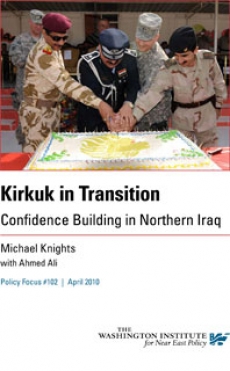| Kirkuk in Transition
Confidence Building in Northern Iraq
Michael Knights
with Ahmed Ali
Policy Focus #102 | April 2010
All rights reserved. Printed in the United States of America. No part of this publication may be reproduced or transmitted in any form or by any means, electronic or mechanical, including photocopy, recording, or any information storage and retrieval system, without permission in writing from the publisher.
© 2010 by the Washington Institute for Near East Policy
1828 L Street NW, Suite 1050 Washington, DC 20036
www.washingtoninstitute.org
Published in 2010 in the United States of America by the Washington Institute for Near East Policy,
1828 L Street NW, Suite 1050, Washington, DC 20036.
Design by Daniel Kohan, Sensical Design and Communication
Front cover: Brig. Gen. Abdul Amir Hassan, division deputy commander of the Iraqi army; Maj. Gen. Thaker Bakr, provincial director of police; Maj. Gen. Anthony A. Cucolo III, commanding general, U.S. 3rd Infantry Division; and Brig. Gen. Shirko Fatih Schiwani, representative of the Kurdistan Regional Government, cut a cake during the Combined Security Force (CSF) graduation ceremony at Kirkuk Training Center, Feb. 15, 2010. The CSF is a unit comprising U.S., Kurdish, and
Iraqi personnel and created specifically to enhance security during Iraqi elections. (DVIDS/Matthew Lestikow)
Michael Knights, a Lafer fellow and interim director of the Military and Security Studies Program at The Washington Institute, has worked on Iraqi political and security issues since the mid-1990s. As head of the Iraq Analysis and Assessments cell for Olive Group, a private security provider, he directed information collection teams throughout the country. He has also provided support for U.S. Provincial Reconstruction Teams and Human Terrain System personnel in Iraq from the outset of both programs. In 2002, Dr. Knights received his Ph.D. in Iraqi security from the Department of War Studies, King’s College, London. In addition to lecturing regularly at American and British military institutions, he has authored, coauthored, or edited many publications on Iraq, including the Washington Institute reports Provincial Politics in Iraq: Fragmentation or New Awakening? (2008), The Calm before the Storm: The British Experience in Southern Iraq (2007), and Operation Iraqi Freedom and the New Iraq: Insights and Forecasts (2004), as well as the U.S. Naval Institute study Cradle of Conflict: Iraq and the Birth of the Modern U.S. Military (2005). He has also published widely on security issues for major media outlets such as Jane’s Information Group.
Ahmed Ali, a native of Iraq, is a Marcia Robbins-Wilf research associate at The Washington Institute. Currently, he focuses on political dynamics in Kirkuk and wider Iraq, Arab-Kurdish relations, democratization, national reconciliation, and legislative-executive relations. In 2003, he worked as an interpreter and guide for French and U.S. media outlets reporting on the Iraq war, including CNN, the New York Times, France 2 Television, and the French magazine Paris Match. In those capacities, he traveled throughout Iraq’s northern provinces. He holds a degree in political science from Grinnell College and speaks Arabic, Kurdish, and Persian. | 